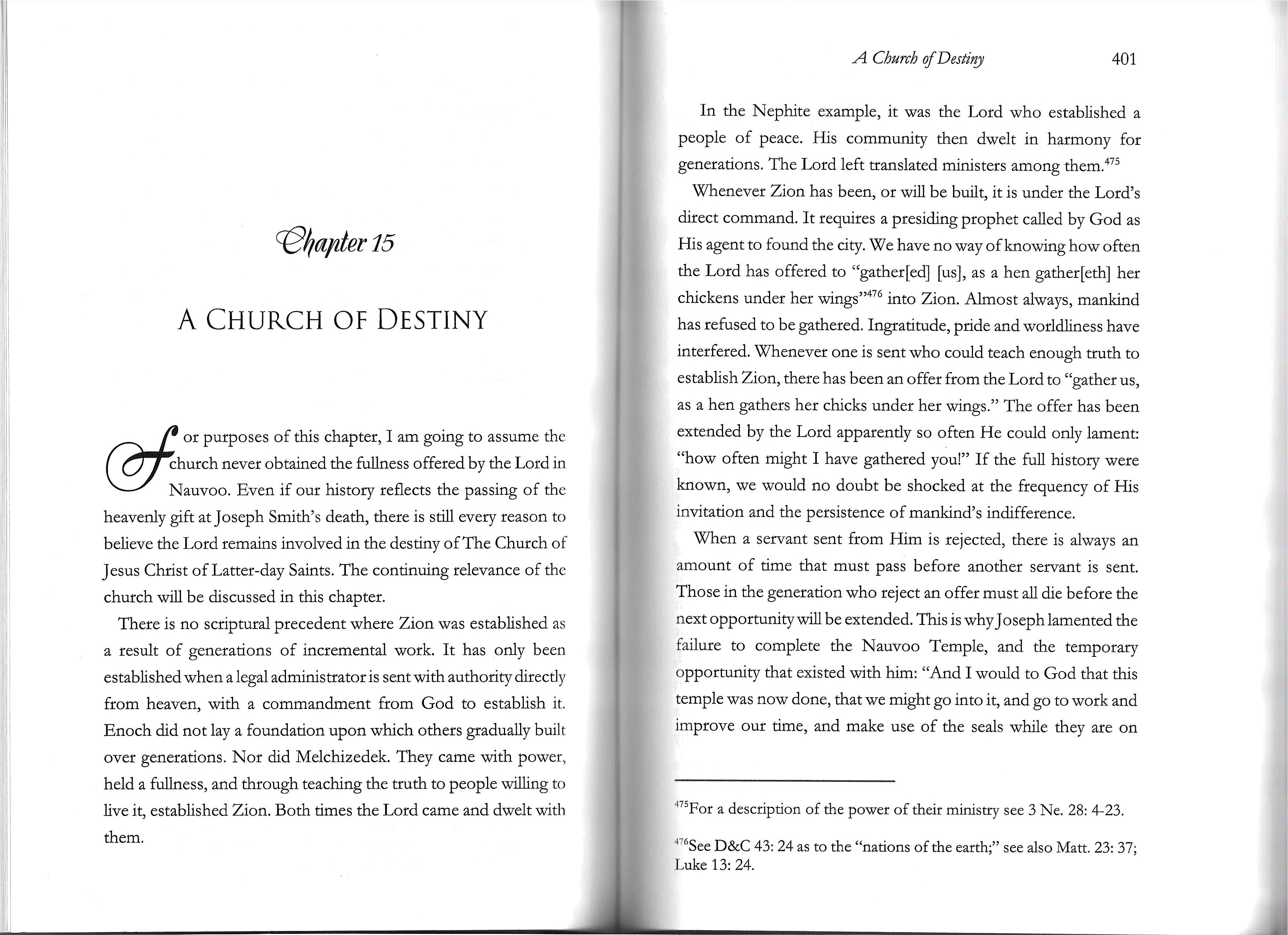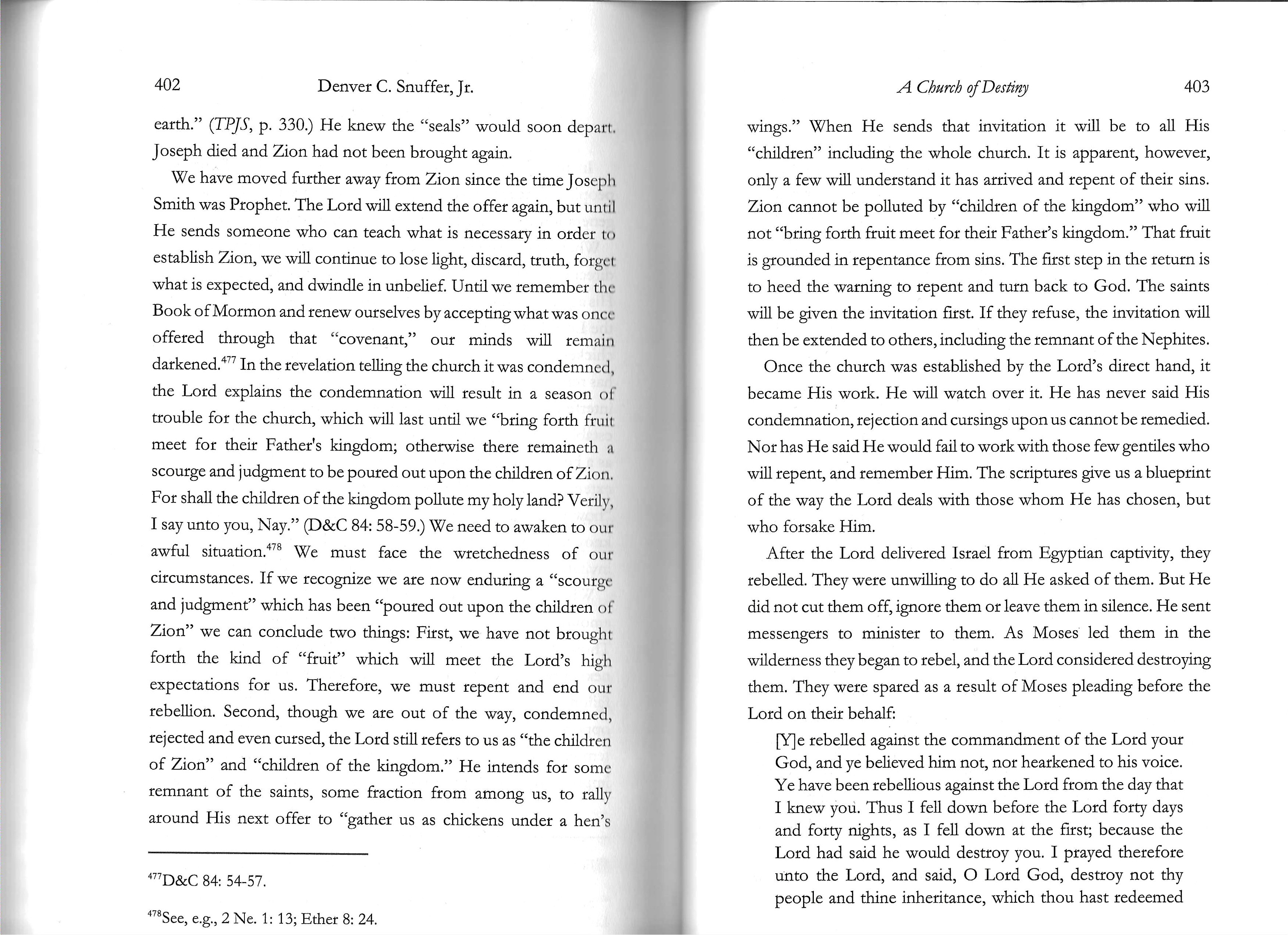DS's main argument about the passing of the heavenly gift.
- Type
- Book
- Hearsay
- Direct
- Reference
Denver C. Snuffer, Jr., Passing the Heavenly Gift (Salt Lake City: Mill Creek Press, 2011), 400-402
- Scribe/Publisher
- Mill Creek Press
- Audience
- Reading Public
- Transcription
For the purposes of this chapter, I am going to assume the church never obtained the fullness offered by the Lord in Nauvoo. Even if our history reflects the passing of the heavenly gift at Joseph Smith's death, there is still every reason to believe the Lord remains involved in the destiny of The Church of Jesus Christ of Latter-day Saints. The continuing relevance of the church will be discussed in this chapter.
There is no scriptural precedent where Zion was established as a result of generations of incremental work. It has only been established where a legal administrator is sent with authority directly from heaven, with a commandment from God to establish it. Enoch did not lay a foundation upon which others gradually built over generations. Nor did Melchizedek. They came with power, held a fullness, and through teaching the truth to people willing to live it, established Zion. Both times the Lord came and dwelt with them.
. . .
When a servant sent from Him is rejected, there is always an amount of time that must pass before another servant is sent. Those in the generation who reject an offer must all die before the next opportunity will be extended. This is why Joseph lamented the failure to complete the Nauvoo Temple, and the temporary opportunity that existed with him: "And I would to God that this temple was now done, that we might go into it, and go to work and improve our time, and make use of the seals while they are on earth." (TPJS, p. 330.) He knew the "seals" would soon depart. Joseph died and Zion had not been brought again.
We have moved further away from Zion since the time Joseph Smith was Prophet. The Lord will extend the offer again, but until He sends someone who can teach what is necessary in order to establish Zion, we will continue to lose light, discard, [sic] truth, forget what is expected, and dwindle in unbelief. Until we remember the Book of Mormon and renew ourselves by accepting what was once offered through that "covenant," our minds will remain darkened. In the revelation telling the church it was condemned, the Lord explains the condemnation will result in a season of trouble for the church, which will last until we "bring forth fruit meet for their Father's kingdom; otherwise there remaineth a scourge and judgement to be poured out upon the children of Zion. For shall the children of the kingdom pollute my holy land? Verily, I say unto you, Nay." (D&C 84:58-59.) We need to awaken to our awful situation. We must face the wretchedness of our circumstances. If we recognize we are now enduring a "scourge and judgement" which has been "poured out upon the children of Zion" we can conclude two things: First, we have not brought forth the kind of "fruit" which will meet the Lord's high expectations for us. Therefore, we must repent and end our rebellion. Second, though we are out of the way, condemned, rejected and even cursed, the Lord still refers to us as "the children of Zion" and "children of the kingdom." He intends for some remnant of the saints, some fraction from among us, to rally around His next offer to "gather us as chickens under a hen's wings." When He sends that invitation it will be to all His "children" including the whole church. It is apparent, however, only a few will understand it has arrived and repent of their sins. Zion cannot be polluted by "children of the kingdom" who will not "bring forth fruit meet for their Father's kingdom." That fruit is grounded in repentance from sins. The first step in the return is to heed the warning to repent and turn back to God. The saints will be given an invitation first. If they refuse, the invitation will then be extended to others, including the remnant of the Nephites.
- Citations in Mormonr Qnas
The B. H. Roberts Foundation is not owned by, operated by, or affiliated with the Church of Jesus Christ of Latter-day Saints.


